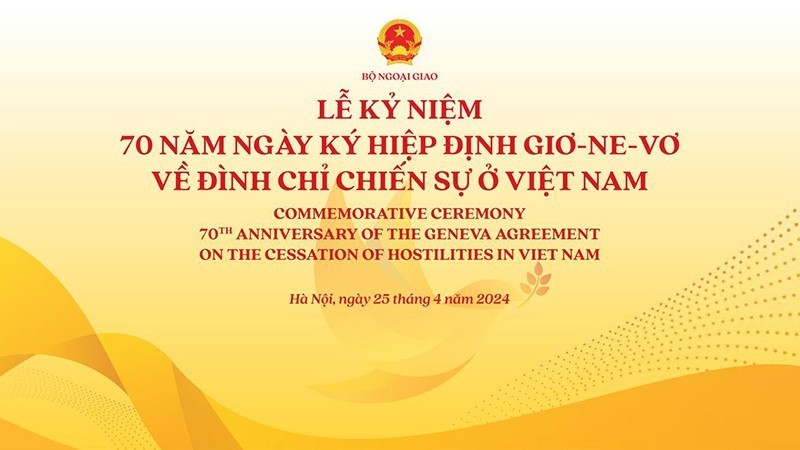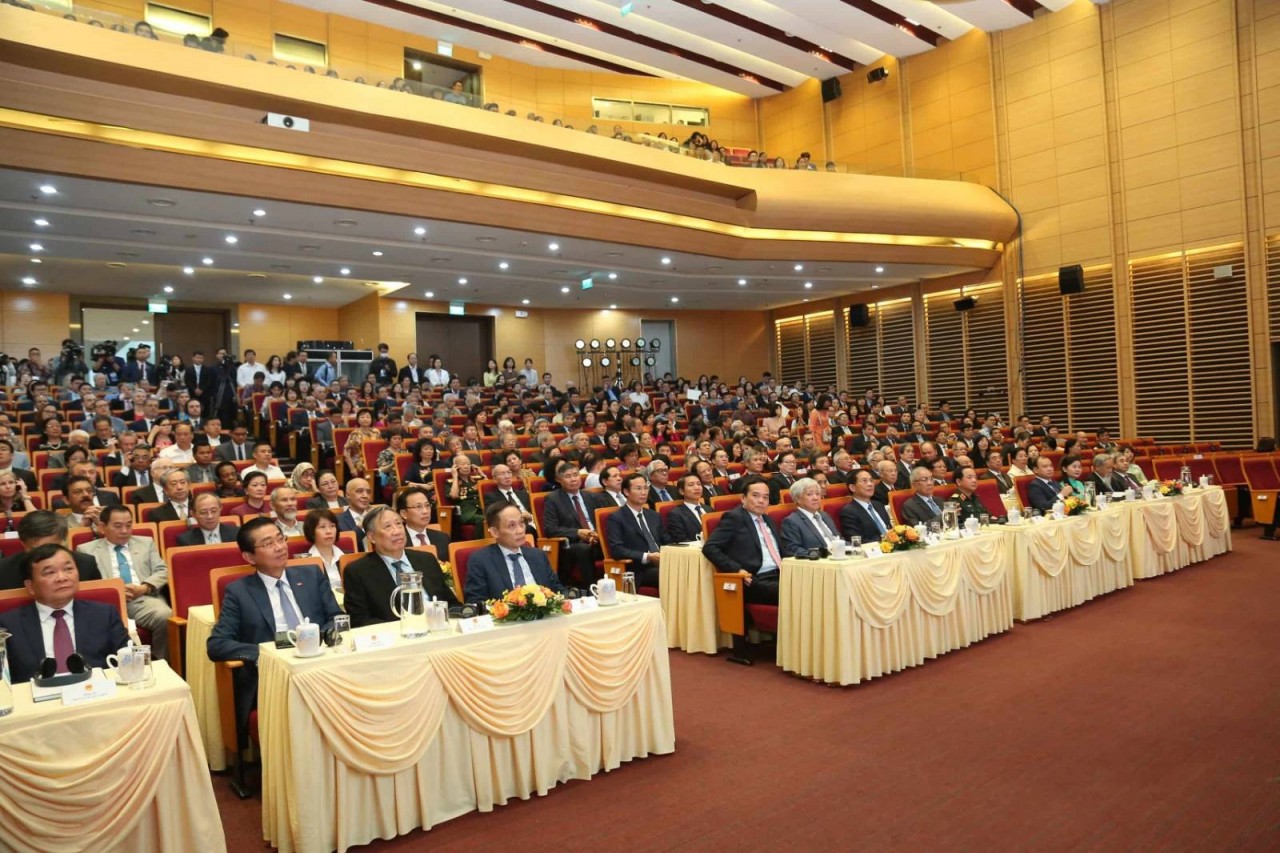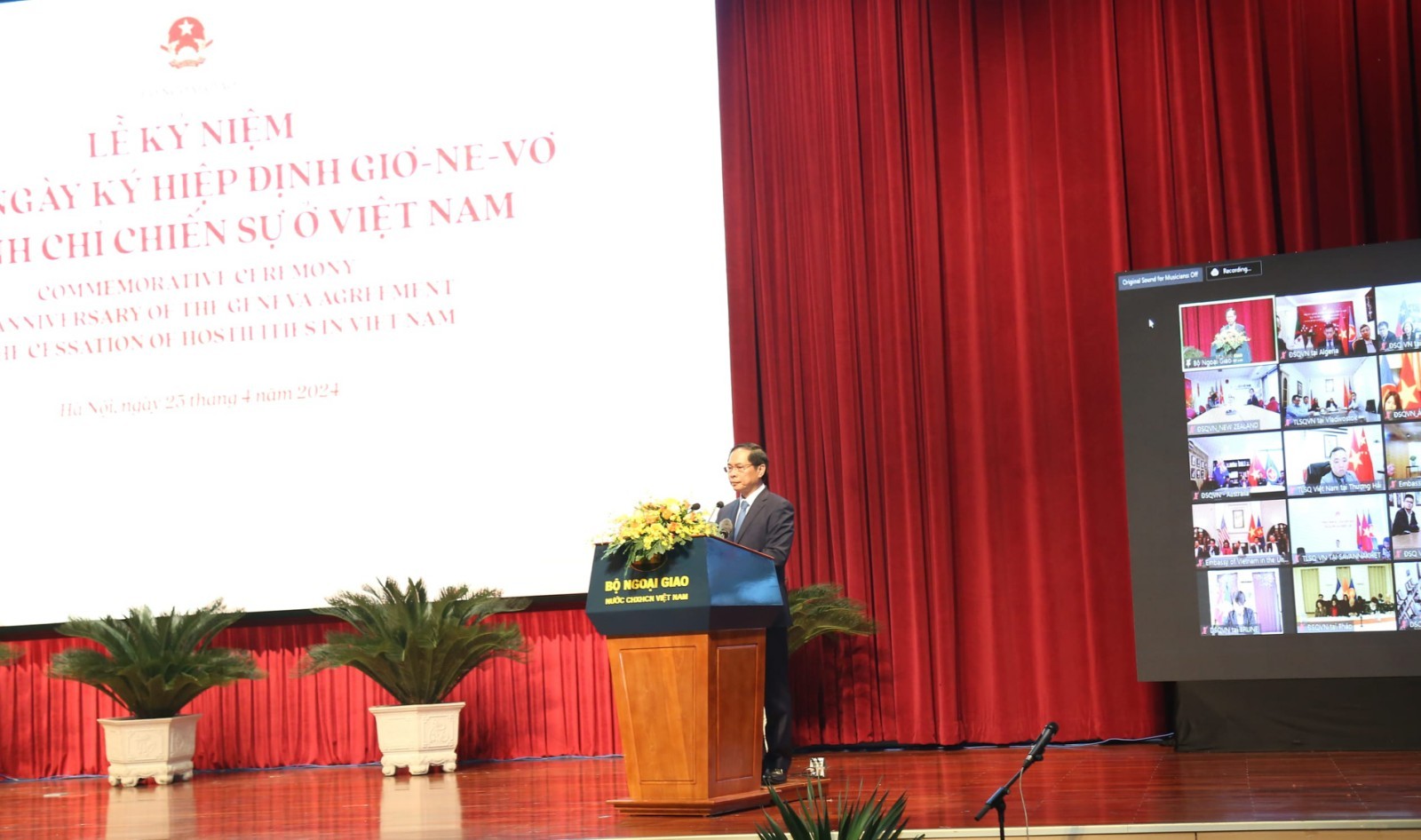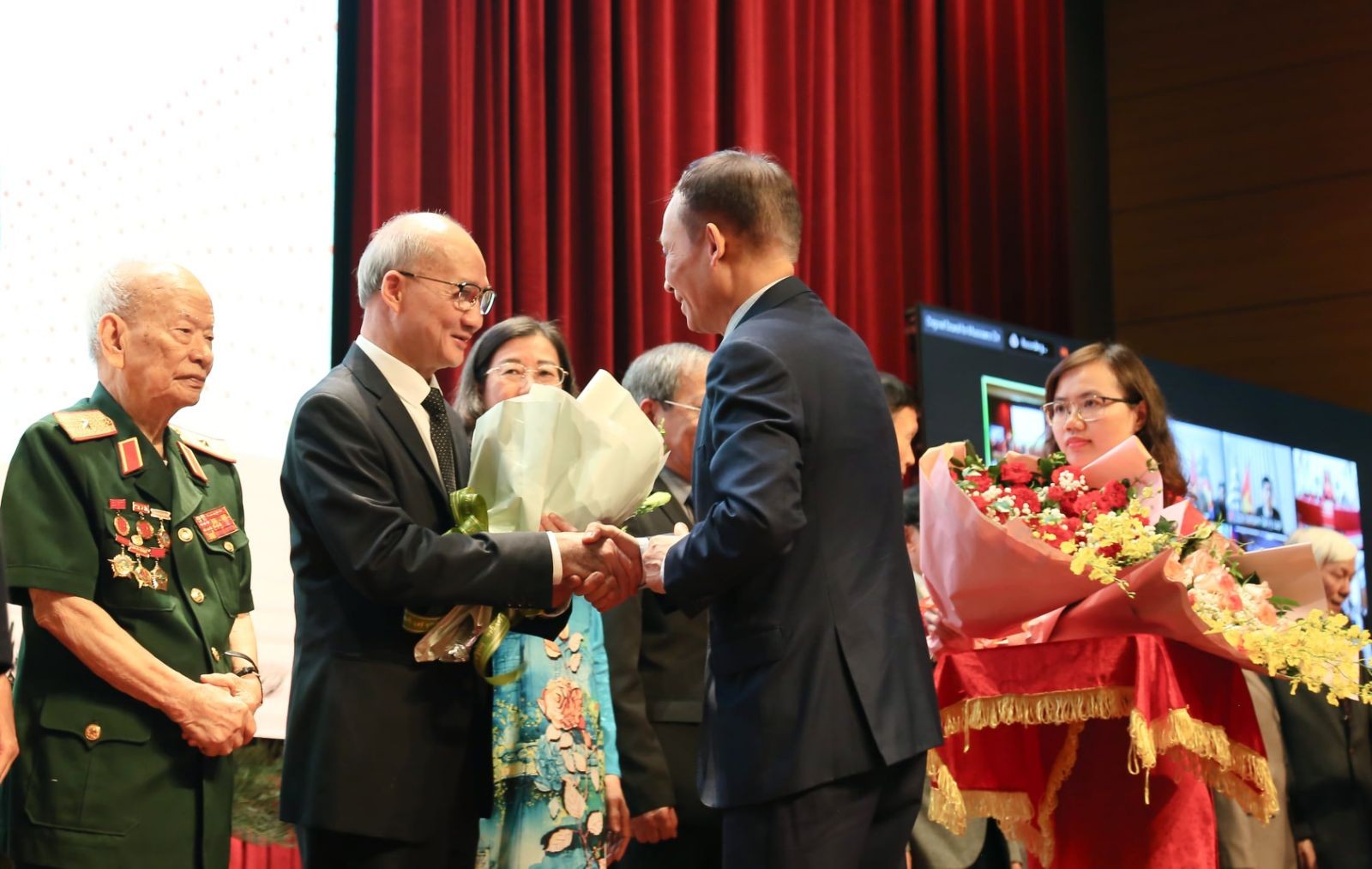
Remarks by FM at Commemorative Ceremony of 70th Anniversary of Geneva Agreement on Cessation of Hostilities in Vietnam
Latest
 |
| Commemorating 70th Anniversary of Signing of Geneva Agreement on Cessation of Hostilities in Vietnam |
Your Excellency Comrade Do Van Chien, Member of the Party Secretariat, Chairman of the Vietnam Fatherland Front,
Your Excellency Comrade Le Hoai Trung, Member of the Party Secretariat, Chairman of the Central Commission for External Relations,
Your Excellency Comrade Tran Luu Quang, Deputy Prime Minister,
Your Excellency Comrade Pham Gia Khiem, former Member of the Politburo, former Deputy Prime Minister and Minister of Foreign Affairs,
Excellencies Members of the Party Central Committee, leaders of the central Ministries, Committees, Agencies and Localities,
Distinguished Vietnamese and international delegates,
As we conduct our planned organization of major national celebrations of 2023 through 2025, and while the whole country rejoices in the lead-up to the 70th anniversary of the victory at Dien Bien Phu and the 49th anniversary of the liberation of the South and national reunification, today the Ministry of Foreign Affairs solemnly holds the Commemorative Ceremony of the 70th Anniversary of the Geneva Agreement on the Cessation of Hostilities in Vietnam.
On behalf of all officers and Party members under the Diplomatic Service, allow me to extend my warmest congratulations and finest salutations to the esteemed leaders of the Party, State, Government, former leaders of the Party, State and the Diplomatic Service, Excellencies Ambassadors, Heads of Diplomatic Missions and International Organizations, leaders of the central ministries, committees, agencies and localities, representatives of families of delegates negotiating, signing and executing the Geneva Agreement and to all distinguished delegates.
Excellencies Leaders of the Party, State and Government,
Distinguished delegates,
Independence, self-reliance and territorial integrity have ever been an unchanging principle throughout the Vietnamese people’s history of many thousands of years building and defending the nation. Grounded in the philosophy of “righteousness and benevolence”, our forefathers always attached high importance to diplomatic undertakings. To interweave military with diplomatic efforts, to concurrently fight and negotiate, to resolutely and perseverantly defend national independence and territorial integrity, that is how the Vietnamese people’s tradition and identity of heroism, love of justice, amity and humanitarianism. “To trump barbarism with righteousness, to supplant tyranny with benevolence”. “To extinguish forever the flames of war and commence a reign of eternal peace”. These are the lasting philosophies and thoughts that shall remain eternal along with the Vietnamese nation.
 |
| Participants at Commemorative Ceremony of the 70th Anniversary of Signing of Geneva Agreement on Cessation of Hostilities in Vietnam, in Hanoi, on April 25, 2024. |
Building on such a noble tradition and essence of the nation, under the leadership of the Party and President Ho Chi Minh, working in close concert with the political and military fronts, the diplomatic front always played a key role in the Vietnamese people’s national liberation, bringing about immense triumphs that brought glory to the annals of our people. From the negotiations to preserve the post-August Revolution independence in 1945 to the negotiation and signing of the 1954 Geneva Agreement, and later the 1973 Paris Peace Accords, these contributions helped set the stage for our people to realize the desire for peace, national independence, unification, development and prosperity.
In his appeal following the success of the Geneva Conference on July 22nd, 1954, President Ho Chi Minh said as much: “The Geneva Conference concluded, here is a huge triumph for our diplomatic service”. In the 1946 Preliminary Agreement, Viet Nam was solely recognized as a free nation. Yet in the Geneva Agreement, the fundamental national rights of our country – independence, sovereignty, unity and territorial integrity – were officially pronounced in an international treaty, signed and recognized by major powers. This is a triumph of immense historical significance for the Vietnamese people. It is a culmination of the resolute and enduring struggle of our entire army and people under the leadership of the Party throughout the nine years of protracted resistance against colonial invasion.
Together with the triumph at Dien Bien Phu renowned across the five continents that shook the world, the signing of the Geneva Agreement marked the successful conclusion of our people’s resistance against French colonialism, opening up a new strategic period for Vietnam’s revolution: building socialism in the North while performing a national democratic people’s revolution in the South in order to realize the goals of peace, national independence, reunification and socialism building nationwide.
The Geneva Conference was the first major multilateral conference to which Viet Nam was party, negotiating and signing an international treaty directly undersigned by major powers. In this debut, the Vietnamese revolutionary diplomatic service successfully presented its stature, intelligence, willpower and essence as befit a nation whose civilization dated back thousands of years, and standing of an independent, sovereign and peace-loving country.
The Geneva Agreement was a watershed victory. Beyond a triumph of the Vietnamese people alone, it was also a victory shared by the three nations of Indochina and the oppressed peoples of the world. This treaty, along with the victory of Dien Bien Phu, was a vigorous cheer for the colonized nations and peace-loving peoples of the world, emboldening their trust in goodness, righteousness and justice in the continued struggle to overthrow colonialism all over the world.
Vietnam’s victory at the Geneva Conference stemmed from the correct revolutionary line and the wise leadership, and direction of the Party and President Ho Chi Minh, and from the burning desire for peace, the heroic patriotism, the mind and the willpower of the Vietnamese nation. The Geneva Agreement was the crystallization of the painstaking struggle and immense sacrifice of our whole army and people, from the 1947 Viet Bac Autumn-Winter campaign through the 1950 Border Autumn-Winter Campaign, all the way to the 1953-1954 Winter-Spring Strategic Offensive culminating in the triumph of Dien Bien Phu.
Within this triumph of the whole nation, it would be remiss not to mention an important contribution by the Vietnamese foreign service, including the direct role of the members of the delegation representing the Democratic Republic of Viet Nam and the supporting staff who played their parts in the negotiation, signing and implementation of the Agreement. The Geneva Conference was a trial by fire for the outstanding leaders and diplomats of the Ho Chi Minh era, such as Comrades Pham Van Dong, Ta Quang Buu, Ha Van Lau, and many other exemplary diplomats.
As we celebrate the 70th anniversary of the signing of the Geneva Agreement, we commemorate and pay our heartfelt tribute to the immense contributions of President Ho Chi Minh, the revolutionary leaders, and great sacrifice of our army and people in the cause of national liberation and reunification. We are deeply grateful to the members of the negotiation delegation and those diplomatic staff taking part in the diplomatic struggle for the implementation of the Agreement.
 |
| Minister of Foreign Affairs Bui Thanh Son speaks at the ceremony. |
Forever shall we remember the altruistic solidarity, support and assistance rendered by the revolutionary forces and peoples of Laos and Cambodia, and the tremendous assistance from the socialist states and the peace-loving people of the world for Vietnam throughout the struggle for national independence and reunification.
Excellencies Leaders of the Party, State and Government,
Distinguished delegates,
Together with the 1946 Preliminary Agreement and the 1973 Paris Accord, the 1954 Geneva Agreement represent a milestone in the history of Vietnamese revolutionary diplomacy, bearing the hallmark of Ho Chi Minh diplomatic thought, style and art. The negotiation, signing and implementation of the Geneva Agreement is a handbook full of profound lessons under the unique school of Vietnamese diplomacy. This has been well continued, built on and advanced in the negotiation, signing and implementation of the 1973 Paris Peace Accords down the line, just as in national construction, development and defense today.
First of all, the lesson of persevering with the principles of national independence and self-reliance, grounded in the interest of the nation-state. This is both a lesson and a fundamental principle throughout the history of nation-building and defense of Vietnam, and a signature of Vietnamese diplomacy. Through consistently adhering to the foreign policy line of independence, self-reliance, diversification and multilateralization of external relations, today Vietnam enjoys diplomatic relations with 193 countries around the world. It has forged strategic and comprehensive partnerships with 30 countries, including comprehensive strategic and strategic partnership with every permanent member of the UNSC. In addition, Vietnam is also an active and responsible member of more than 70 prominent regional and global organizations and forums, such as the United Nations, ASEAN, WTO, APEC, ASEM… It is no exaggeration that Vietnam has never had such a broad and solid network of international partners and friends as it does today.
Second, the lesson of combining the power of the nation with the power of the times, and of linking all-nation solidarity with international solidarity. This is evident throughout the course of national liberation on the whole, and specifically in the negotiation, signing and implementation of the Geneva Agreement. In addition to fully harnessing the power of the entire nation and hoisting the banner of justice, Vietnam was tirelessly expanding international solidarity grounded in an altruistic spirit of internationalism. In this way, we were able to call on the support, consensus and assistance from international friends and the peace-loving people of the world to bolster the righteous struggle of the Vietnamese nation.
Creatively applying this lesson in the Doi Moi process today, Vietnam has been proactively engaged in extensive and effective international integration, hand-in-hand with building an independent and self-reliant economy. In doing so, we have been able to rouse and make full use of a wide range of domestic growth engine working alongside external resources, most of all market, investment, knowledge and technology. These are an important contributor to bolstering national strength, status and combined power.
Third, the lesson of persevering with an overarching goal and principle while remaining flexible and maneuverable in tactics and creative in action, as per the saying “Firm in principle, but flexible in application”. This is both a lesson and a method and an art under the Ho Chi Minh school of diplomacy. The spirit of the Vietnamese bamboo is embodied herein, whose roots are solid, whose stems are firm, whose branches are flexible. In the negotiation, signing and implementation of the Geneva Agreement, the constant “root” was Viet Nam’s independence, unity and territorial integrity. And “Flexible in application” meant, while the strategic goal was yet beyond reach, we exercised a degree of flexibility in tactics, in order for the goal of national independence and reunification to be realized in stages.
Faced with the deeply complex turmoil of the world today, through an innovative application of “Firm in principle, but flexible in application”, Vietnam has been able to judiciously address its foreign relations through staying true to the principle while exercising flexibility in tactics and treatment, upholding amity and friendship, and persevering with dialogue and cooperation. This has helped us both maintain an environment of peace and stability while steadfastly defending national independence, sovereignty and territorial integrity, and advance cooperation in the interest of socio-economic development.
Fourth, the lesson of making full use of the vanguard role of diplomacy, to use peaceful dialogue and negotiation to address disputes and conflicts in international relations. Along with the decision to commence the strategic 1953-1954 Winter-Spring Offensive, our Party sought to use peaceful negotiation as a channel to bring conflict to a close, making dialogue a possible way to put an end to the war in Indochina. This correct line of action stems from the philosophy of amity and humanitarianism, in which the Vietnamese nation has long been immersed. We have ever aimed to use the pen, not soldiery, seeking every way to prevent the scourge of war. Building on this noble tradition of the nation, Vietnam remains consistent with its foreign policy line of peace, friendship, cooperation and development: to be a trusted friend and partner, and an active and responsible member of the international community, and to support settlement of disputes and conflicts in the world through peaceful means.
Fifth, the lesson of attaching due importance to researching, evaluating and forecasting global developments: to know oneself and others, to know the time and tide, and in doing so, to know how to advance and retreat, and know when to be tough and when to be gentle. This lesson remains relevant in the world today, as we face a world a region fraught with complex and hard-to-predict changes. As such, it is all the more essential to redouble research and forecast efforts, in order to come up with proper measures to best safeguard the interest of the nation-state.
Last but not least, an overarching lesson is the unified and complete leadership of the Party over the revolutionary cause of our people as a whole, and specifically the diplomatic front. The Party set out a judicious policy, line of action and strategy, through establishing an actively engaged diplomatic front to win initiative while working in close concert with the political and military fronts to bring about a combined power in service of national liberation, reunification, construction and defense.
 |
| Flowers presented to the family members of the delegation negotiating, signing and implementing the Geneva Agreement |
Apart from these striking lessons, many more are the invaluable things we have learnt from the Geneva Agreement. These should be continually studied, reviewed and put together in order to enrich the library of Vietnamese diplomatic thoughts, style and art, a school of diplomacy embodied in the Vietnamese bamboo.
Excellencies Leaders of the Party, State and Government,
Distinguished delegates,
Peace, cooperation and development are the shared aspiration and interest of all nations and states and progressive mankind the world over. Having suffered immense losses and sacrifices in its wars of resistance against foreign invasion, Vietnam always cherishes the value of peace. We uphold and respect the fundamental principles of the UN Charter and international law. We remain true and faithful to our international friends, and shall contribute all that we can to the common efforts of the international community for peace, national independence, democracy, cooperation for development and social progress in the world.
Building on the honored tradition of the Vietnamese diplomatic service and the spirit of the Geneva Agreement, the entire diplomatic service, under the leadership of the Party, resolves to build itself into a well-rounded, professional and modern foreign service. Doing so will certainly be a befitting contribution to the successful delivery of the foreign relations line established by the 13th National Party Congress, for a wealthy people and a strong, democratic, equitable and civilized nation.
On behalf of the Ministry of Foreign Affairs, I would like to extend my best wishes to Excellencies leaders and former leaders of the Party, State, Government, the Vietnam Fatherland Front and the diplomatic services, to the family members of the delegation negotiating, signing and implementing the Geneva Agreement, and all distinguished guests and international friends. May good health, happiness and many successes be with you in your noble capacities.
Thank you very much.













